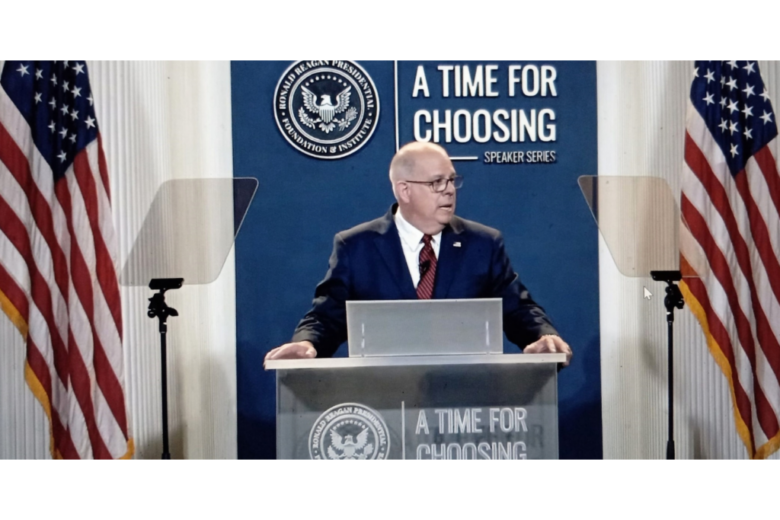This article was republished with permission from WTOP’s news partners at Maryland Matters. Sign up for Maryland Matters’ free email subscription today.
This content was republished with permission from WTOP’s news partners at Maryland Matters. Sign up for Maryland Matters’ free email subscription today.
Just as Maryland Gov. Lawrence J. Hogan Jr. (R) was finishing his half-hour speech at the Ronald Reagan Presidential Library in Simi Valley, Calif., Tuesday night, urging Republicans to follow Reagan’s path, Politico and TV networks were declaring author J.D. Vance the winner in the Republican primary for U.S. Senate in Ohio.
Vance’s come-from-behind victory was largely fueled by a late endorsement from President Trump, trampling on Hogan’s message and perpetuating the narrative that Trump remains the unparalleled driving force within the GOP.
Hogan has a different view of his party. Since the election of 2020, he has attempted to wrap himself in Reagan’s cloak — ever since he revealed that he cast a write-in vote for the late 40th president rather than for Trump or President Biden that November. He has made the case that Republicans should follow Reagan’s example, harkening back to an era when Reagan rang up landslide victories and expanded the GOP base.
Since Trump was elected in 2016, Hogan regularly points out, Republicans have lost the White House, lost control of the U.S. Senate and U.S. House, and slipped in the number of governorships and legislative chambers they possess. Citing his own improbable wins in Maryland in 2014 and 2018, Hogan said Republicans must build a bigger coalition.
“In 2022 and 2024, Republicans have an historic opportunity to put America back on the right course,” he said Tuesday night. “While there are those who are more interested in attacking their fellow Republicans than growing and rebuilding the Republican party, my focus has been and will continue to be, on growing that bigger tent and on building a lasting governing coalition to Change America for the Better. Just like Ronald Reagan did.
“The divide in our party today really isn’t ideological. It’s more of a difference between those who know how to win, and those who only pretend that they won.”

Hogan was the latest speaker in a series sponsored by the Ronald Reagan Presidential Foundation & Institute called “Time for Choosing,” inviting Republican leaders to discuss the future of the party. The series kicked off a year ago with former U.S. House Speaker Paul Ryan (R-Wis.) and has included several Republicans who, like Hogan, may be eyeing a White House run in 2024, including former New Jersey Gov. Chris Christie, Arkansas Sen. Tom Cotton, former South Carolina Gov. Nikki Haley, South Dakota Gov. Kristi Noem, former Vice President Mike Pence, former Secretary of State Mike Pompeo, and South Carolina Sen. Tim Scott.
That group runs the gamut when it comes to fealty to Trump, with Hogan clearly the least Trumpy of the lot. The final quarter of his speech was full of criticisms of Trump and the movement he leads.
“Excuses, lies, and toxic politics will not win elections or restore America,” Hogan said. “Only real leadership will do that. We won’t win back the White House by nominating Donald Trump or a cheap impersonation of him. The definition of insanity is doing the same thing over and over again and expecting a different result.”
While many Republicans of multiple generations and differing ideologies admire Reagan — as do many independents and even Democrats — he is a sepia-toned figure now. His political career began in 1966, with his election as governor of California. He was elected president in 1980 on his third try. He left office in 1989, announced he was suffering from Alzheimer’s disease in 1994, and died a decade later. He remained the guiding force of the national Republican Party for many years after — arguably, until the emergence of the tea party in 2009 and Trump in 2015.
But it’s Trump’s party now, and the Ohio results reinforced that.
As he charts his future in the national political conversation — whether he launches a 2024 presidential bid or not — Hogan has clearly cast his allegiance with the anti-Trump crowd, and he’s hoping their ranks grow within the GOP. But while he may have once envisioned himself the lone vehicle in the never-Trump lane, he seems to have company there now among potential White House aspirants — a group that includes U.S. Rep. Liz Cheney of Wyoming, U.S. Rep. Adam Kinzinger of Illinois, Arkansas Gov. Asa Hutchinson, and, depending on the day, his good friend Christie.
Hogan’s status in the party has gotten him plenty of attention in Washington, D.C. media circles. He’s a regular on network and cable chat shows whenever they need a “common-sense” Republican outside of the Trump column. His speech at the Reagan library may have broadened his exposure.
Hogan told the audience Tuesday night that Reagan and his father, the late congressman Lawrence J. Hogan Sr. (R), were “the two leaders who inspired me to become a Republican.”
Hogan recounted his father’s history as the first Republican serving on the House Judiciary Committee to support impeaching President Nixon during Watergate — and the political price he paid for it. But he said that he and his father diverged during the 1976 presidential election, when the elder Hogan supported President Ford in the GOP primary, while the younger cast his lot with Reagan.
“Family considerations notwithstanding, I was for the Gipper 100%,” Hogan said. “Some kids rebelled by getting into trouble and partying at Woodstock. I rebelled by campaigning for Ronald Reagan. From that moment on, I became a lifelong, committed, common sense conservative from the Reagan wing of the Republican Party. And I still am.”
Hogan did not mention that he had written in his father’s name for president during the 2016 election, as he would with Reagan four years later.
The next section of his speech would sound familiar to Marylanders: A recitation of his own rise in state politics, propelled by voter anger over consecutive tax increases under the Democrats, and a sagging economy and business climate. Then, the economic turnaround, the state’s tough response to the 2015 Baltimore uprising, and Hogan’s enduring popularity in the polls. He compared his handling of the Baltimore unrest to Reagan’s “doctrine of peace through strength.”
“We didn’t get any of this done by resorting to the phony partisan posturing that is so typical in this age of performative politics,” Hogan said. “In my first inaugural address, in 2015, I pledged that ‘the politics that have divided our nation need not divide our state,’ and they haven’t. We have sought out and achieved bipartisan commonsense solutions that worked for all the people of our state.
“It turns out that’s exactly what most voters want. While most Americans think the nation is way off track, the overwhelming majority of Marylanders believe our state is headed in the right direction.”
Hogan then pivoted to criticism of Biden, whom he accused of being captive “to the far-left extremes of his party and flails from crisis to crisis, showing weakness to the world.”
“Just like in 1980, America is beset by out-of-control inflation, an energy crisis is hurting struggling families and small businesses, and violent crime is devastating our cities and communities. Instead of offering Americans relief, the Biden administration tries to jam through a reckless grab bag of progressive wish list items, massive spending and tax hikes, and handouts to special interests.”
But then Hogan turned his fire on the Trump-era GOP.
“A party that lost the popular vote in seven out of the last eight presidential elections, and that couldn’t even beat Joe Biden, is desperately in need of a course correction,” he said. “The truth is the last election was not rigged and it wasn’t stolen. We simply didn’t offer the majority of voters what they were looking for. Jan. 6 was not enthusiastic tourists misbehaving. It was an outrageous attack on our democracy, incited by the losing candidate’s inflammatory false rhetoric.”
And Hogan said that striving to be “better than the Democrats isn’t good enough.”
“There is a better path forward,” he said, “if we only we have the courage to seize it.”







